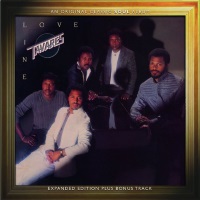Tavares - Loveline
By the time of 1981's Loveline, the days of the great marriage between Capitol Records and the five hitmaking Tavares brothers were numbered. Ten albums was a looooong time for an act to be on the same record imprint, but the combination of the West Coast label, the New Bedford, Massachusetts siblings, and the guiding hand of manager Brian Panella had yielded consistently strong recordings in a variety of styles (soul, disco and even some pop) and nearly as consistent chart relevance, if not superstardom. However, the normal fraying of relationships over time in the music industry, combined with a dispute regarding a potential live album, led Tavares to split with both Panella and Capitol -- regrettable decisions that likely accelerated the demise of the quintet's recording career, which effectively ended after 1983's Words and Music on RCA Records.
Tavares - Loveline
By the time of 1981's Loveline, the days of the great marriage between Capitol Records and the five hitmaking Tavares brothers were numbered. Ten albums was a looooong time for an act to be on the same record imprint, but the combination of the West Coast label, the New Bedford, Massachusetts siblings, and the guiding hand of manager Brian Panella had yielded consistently strong recordings in a variety of styles (soul, disco and even some pop) and nearly as consistent chart relevance, if not superstardom. However, the normal fraying of relationships over time in the music industry, combined with a dispute regarding a potential live album, led Tavares to split with both Panella and Capitol -- regrettable decisions that likely accelerated the demise of the quintet's recording career, which effectively ended after 1983's Words and Music on RCA Records.
With this friction in the background, Loveline (which is newly reissued on the SoulMusic.com label), was commercially doomed by the time of its initial release, as Tavares was a lame duck act -- likely seen as "old school" -- on a label that was itself trying to adjust to the emerging funk market. But, despite this unfortunate backdrop, artistically Loveline was a decent shot by all parties at a new sound that was quite contemporary for 1981 and, as was the case with all 12 Tavares albums, exquisitely performed. Stylistically, Loveline was a departure: the prior year's release, Love Uprising, had a breezy, horn filled sound that (especially on the title track) captured the glow of Earth, Wind & Fire's glory days and appeared to give the Tavares brothers room to experiment with vocal arrangements in breathtaking ways. Conversely, Loveline embraced the funk sound that was emerging from New York and London, trying to thread the needle by inserting the classic Tavares harmonies into a style that focused much more on beats and synthesizers than vocal performances.
British producer Alan Abrahams took the helm for the Loveline sessions, and he brought a bevy of great musicians along, including bassist Nathan East and guitarists Paul Jackson, Jr. and Charles Fearing. More importantly, he connected the group with a number of talented songwriters, including an at-her-peak Brenda Russell and a songwriting star in the making, Kashif. Abrahams also took Tavares' storied vocals in a different direction more in-line with the 80s funk scene, spreading lead among all five brothers (notably reducing Chubby Tavares' leads to three) and simplifying the backing vocals to a conservative, more muted call-and-response, a notable change from the complex, often dazzling vocal performances on Love Uprising. The result was a fairly by-the-book 80s soulful funk album that lived or died with the songwriting; and for the most part the material was strong enough to make Loveline a critical success.
There is little doubt that the gem of the album is the title track, a prototypical Kashif funk driver that should have been a #1 hit, but -- perhaps due to Capitol's marketing indifference at the time -- peaked outside of the Top 40. The song has aged surprisingly well, sounding great nearly three and a half decades later despite its reliance on heavy 80s synthesizers. Nearly as good is the disc's first single, the sexy urban ballad "Turn Out the Nightlight," another quality song that died a premature death on radio. Russell's two song contributions are solid: "I Don't Want to Fool You" has a minimalist arrangement, with Elliott Randall's solo electric guitar leading into a nice vocal mix of interchanging leads and group harmonies. Better yet is her lush ballad "God Bless You," with Ralph Tavares taking a rare lead, supported by the most full throated harmonies on the album.
Some of the other cuts haven't survived as well, with the dated arrangements made more noticeable by underlying songs that weren't that great. "House of Music," "Touche" and "Better Love" had the feel of album filler in 1981, and haven't improved with time. Fortunately, while Kashif's other contributions, "Keep On" and "Right On Time," weren't among his best, they were strong enough to be net positives for the set, then and now.
Like many of the early 80s albums by classic soul vocal groups like The Temptations, The Stylistics, and Blue Magic, who were adjusting to the changing musical environment, Loveline is a mixed bag of hits and misses -- decent to very good songs, all made a bit better by the typically on point Tavares vocals. The brothers were never less than professional and convincing in their performances on Loveline, even as they were attempting to fit into an emerging funk scene that often rewarded different qualities.
Kevin Goins' liner notes give great context to the Loveline reissue and help round out SoulMusic.com's nice package for a Tavares album that is certainly not among the group's essential discs, but which has enough positive moments to make it a worthwhile addition for fans who have been scooping up the act's enviable discography over the past five years. Plus, the dimly lit cover photo is timeless, quintessential urban cool. Recommended.
By Chris Rizik

